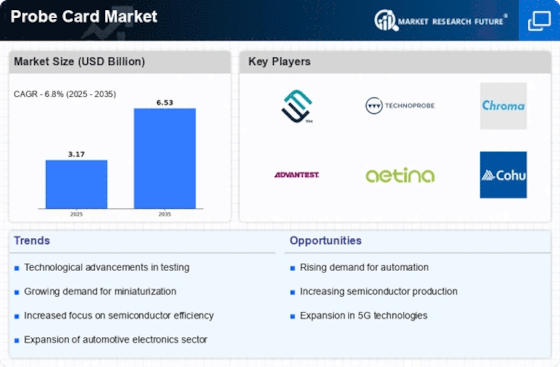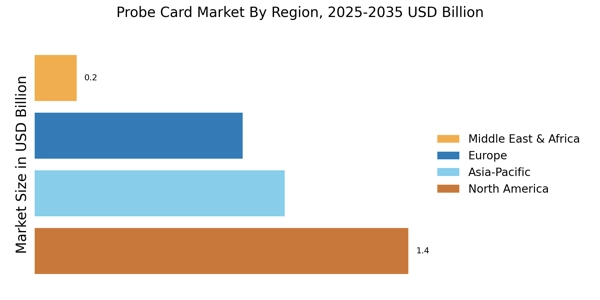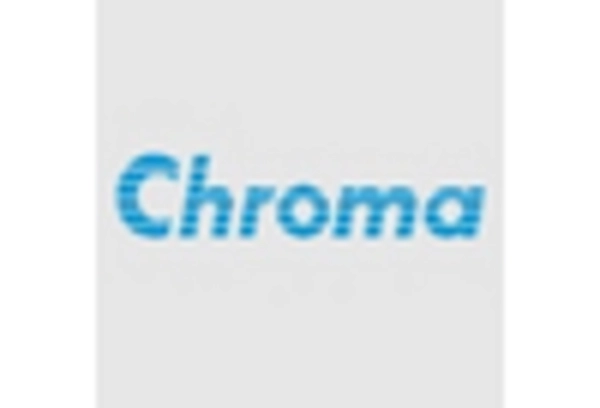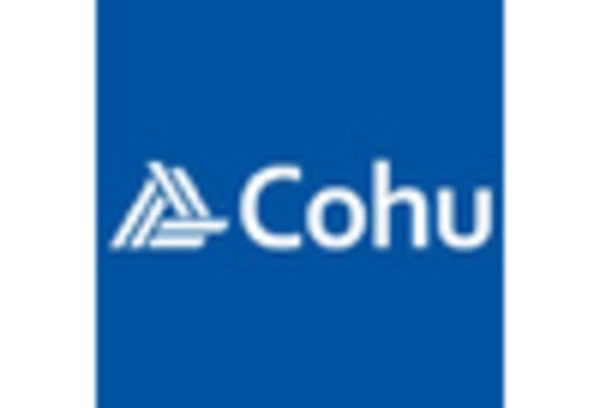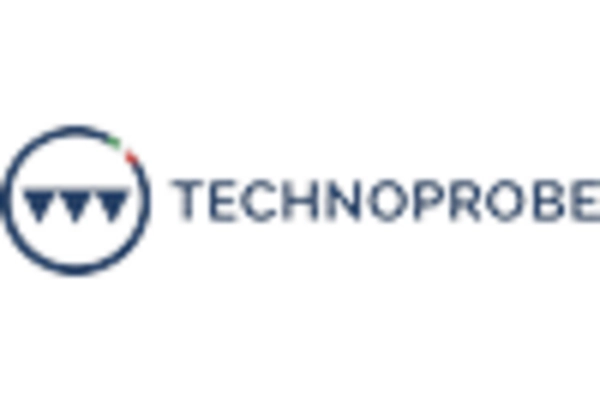Expansion in Emerging Markets
The Probe Card Market is witnessing notable expansion in emerging markets, driven by increasing investments in semiconductor manufacturing. Countries such as India, Vietnam, and Brazil are ramping up their production capabilities, creating a burgeoning demand for efficient testing solutions. This expansion is fueled by government initiatives aimed at boosting local manufacturing and attracting foreign investment. As these markets develop, the need for advanced probe cards becomes critical to ensure quality and reliability in semiconductor testing. Market analysts suggest that the growth in these regions could account for a substantial share of the overall market, with projections indicating a potential increase of 7% in demand for probe cards in emerging economies over the next few years. This trend presents opportunities for manufacturers to establish a foothold in these rapidly evolving markets.
Growing Demand for Miniaturization
The trend towards miniaturization in electronics is a key driver for the Probe Card Market. As devices become smaller and more compact, the need for precise and efficient testing solutions intensifies. This demand is particularly evident in sectors such as mobile devices, wearables, and IoT applications, where space constraints are paramount. The Probe Card Market is adapting to these requirements by developing smaller, more efficient probe cards that can handle high-density interconnections. Market data indicates that the miniaturization trend is expected to contribute to a significant portion of the projected market growth, with an estimated increase of 5% in demand for miniaturized probe cards over the next few years. This shift not only enhances performance but also aligns with consumer preferences for sleek, portable technology.
Increased Focus on Quality Assurance
Quality assurance remains a pivotal concern within the Probe Card Market, as manufacturers strive to meet stringent testing standards. The increasing complexity of semiconductor devices necessitates rigorous testing protocols to ensure reliability and performance. Consequently, there is a growing emphasis on the development of high-quality probe cards that can withstand rigorous testing conditions. This focus on quality is likely to drive innovation in materials and design, leading to the creation of more durable and efficient probe cards. Market data suggests that investments in quality assurance technologies are expected to rise by approximately 8% in the coming years, reflecting the industry's commitment to maintaining high standards. As companies prioritize quality, the Probe Card Market is poised for growth, with enhanced products that meet the evolving demands of the semiconductor sector.
Rising Adoption of Electric Vehicles
The Probe Card Market is also influenced by the rising adoption of electric vehicles (EVs), which require advanced semiconductor technologies for efficient performance. As the automotive sector transitions towards electrification, the demand for high-performance chips increases, necessitating effective testing solutions. Probe cards play a crucial role in ensuring the reliability of these semiconductor components, which are integral to EV functionality. Market analysts indicate that the automotive semiconductor market is projected to grow by approximately 10% annually, further driving the need for specialized probe cards. This trend highlights the importance of the Probe Card Market in supporting the automotive industry's shift towards sustainable technologies. As the demand for EVs continues to rise, the Probe Card Market is likely to experience significant growth, aligning with the broader trends in automotive innovation.
Technological Advancements in Probe Card Market
The Probe Card Market is experiencing a surge in technological advancements that enhance testing efficiency and accuracy. Innovations such as advanced materials and design methodologies are being integrated into probe card manufacturing. For instance, the introduction of MEMS-based probe cards has shown to improve performance metrics significantly. The market is projected to grow at a compound annual growth rate of approximately 6.5% over the next five years, driven by these advancements. Furthermore, the increasing complexity of semiconductor devices necessitates more sophisticated testing solutions, which probe cards provide. As manufacturers strive for higher yields and lower costs, the adoption of these advanced technologies in the Probe Card Market is likely to accelerate, ensuring that companies remain competitive in a rapidly evolving landscape.

